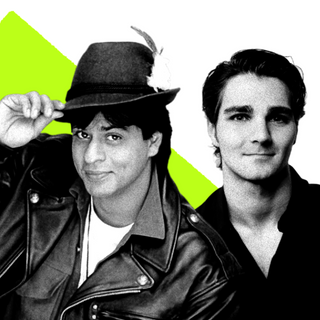
The Multiverse as a Storytelling Device Fails to Capture the Anxiety of the Present. Where Does Fiction Go Next?
Shows like “The Boys” and “The Umbrella Academy” explore the surreal in our own world — grounding us in our damning reality.

With Ms. Marvel (2022), it will now take us 100 hours to get through the compendium that is the Marvel Cinematic Universe. A daunting task for the freshly or casually acquainted. By the time one reaches the bottom of this endless scroll, there will surely be more additions on the top.
As with the comics, the studio gave us smaller-stakes films to get us invested in characters, all the while building to the bigger-budget, grandiose crossover events in Avengers: Infinity War (2018) and Avengers: Endgame (2019). The only way to super-size from there was to have not one carefully connected universe but many such.
On screen and in our imaginations, we have arrived at a genuine multiverse fatigue. With movies like Spider-Man: No Way Home (2021), Doctor Strange: Multiverse of Madness (2022), and the series WandaVision (2021) other universes have been sparked off in Marvel’s docket as well as new ones in DC comics with The Flash. Even Warner Bros. tried a monsterverse with Godzilla vs. Kong (2021). As one Letterboxd user puts it: “Multiverse this multiverse that aren’t you bored of this mf topic? Every f***ing movie is about the multiverse since the spiderverse…”
This multiverse oversaturation is especially tedious when we’re eager to put the pandemic behind us, ready to re-enter time and stop our escapist, disjointed dreams.
The multiverse isn’t merely a storytelling crutch but also an ineffective metaphor. While it contains the promise of largeness and depth, all the idea does is falsely placate us: If you aren’t living your best life here, be happy that somewhere out there a version of you is. Like Wanda, we’re forever stuck in a quest for a different reality. And, like Wanda, we grow indifferent to the pain of others to justify our own potential.
There are ramifications to the multiverse that go beyond the pitfalls of wish fulfillment and fix-it fiction. The conceit of infinite possibilities removes real stakes and doesn’t allow for finite change or growth. Nothing matters because the stakes aren’t real. The multiverse molds how we perceive ourselves and the agency we exhibit. It interferes with the notion that it is our individual responsibility to give our lives meaning.
When we constantly place ourselves in the context of “what if” and “if only” – as the multiverse mindset encourages us to – we gauge our happiness in terms of how things could have gone better or worse. This keeps us far from the present moment and finding contentment within it. In a way, multiverses are all about what didn’t happen.
According to writer Sam Kriss, the multiverse is a “rotting culture.” What looks like an opening up of options is actually “an organized assault on the unreal: the delicate networks of falsehood, the boundlessness of counterfactuals, the imagination as such.”
Related on The Swaddle:
In ‘Multiverse of Madness,’ Grief Lies at the Heart of Horror
Interconnected universes represent the ultimate commercialization of pop entertainment. There’s a shift in how entertainment is consumed. All visual media is now serialized. It’s like programming singularity has been achieved. The multiverse is the peak manifestation of what Martin Scorsese called “theme-park cinema.”
A Reddit user sums it up: “I absolutely LOVE superheroes and Marvel but I just don’t like the multiverse and different timelines. I feel like I can’t have an emotional attachment to anything since all I keep thinking is “oh well, they’re going to come up with another timeline where they don’t die.” Not only does the multiverse box out other kinds of entertainment by being impossible to avoid, but it also comes with an intense fear of missing out.
Post-multiverse then has to be a deconstruction of the trope, a return to what is happening in the present.
In the latest season of The Umbrella Academy (2019), a bunch of supers are tired of saving the world that just won’t stop needing saving. Instead, they decide to prioritize their individual lives. When it is clear to them that, in spite of their super potential, the apocalypse is inevitable, they focus on a wedding to enjoy the little time they have left. The show recognizes that the only way to be truly alive is to block out the nagging future and the overbearing past and exist in the present moment.
If fans’ reactions to “I Love You 3000” and Captain America passing his shield are anything to go by, emotions are a bigger hook than spectacle. This is also what The Umbrella Academy prioritizes. The action is not the point of the show; it is not eager to set up its next installment. Instead, it highlights the shared trauma of the Hargreeves siblings.
This is also the message of Everything Everywhere All At Once (2022). Where Marvel time travels or pops over to another universe to save people and fix timelines, EEAAO recognizes that peace is less about enabling the right path and more about working together to achieve equilibrium.
Post-multiverse is also a response to the cultural institution of Marvel itself. The Boys (2019), for example, satirizes the MCU by inventing its own cinematic juggernaut, the Vought cinematic universe, which reduces identity representation to tokenistic marketing. Like EEAAO, The Boys sheds light on our obsession with extraordinariness. It stands so resolutely against alternate timelines, grounding us in the damning reality that, in spite of everything, there is only one life, the value of which is lessened by superheroes.
The multiverse as a trope also contains certain features that the broader culture has moved on from, such as strict genre-true content, good-versus-evil binaries, and gratuitous conclusions. Most significantly, Marvel’s championing of alternate realities comes at a time of utter distrust toward tech monopolies. Today, we have to develop tunnel vision to survive the multiverse that is the internet. Our online brains have to make sense of a lot of disparate data that the internet bombards us with. Produced images exist alongside unproduced images. On social media, news and advertisement are given equal visual emphasis. Technology works on us through algorithms that are personalized. And so, we don’t need to look at outer space or fantasize about alternate universes, for we live multiple virtual lives already.
Perhaps what comes next is the exploration of the surreal in our own world. Stories of real-life punctuated with ambiguous terror and mystery, showing us what it’s like to live contemporarily without telling us.
Eisha is an independent journalist and illustrator from Mumbai, who has written on mental health, music, and culture. She was a content and curatorial associate for Sarmaya Arts Foundation, where she wrote on history, photography and art. Find her on @eisha_nair on Twitter and @eishaenterprises on Instagram.
Related


Calls to Boycott ‘Laal Singh Chaddha’ Show How Bigotry Underlies Anti‑Bollywood Sentiments
